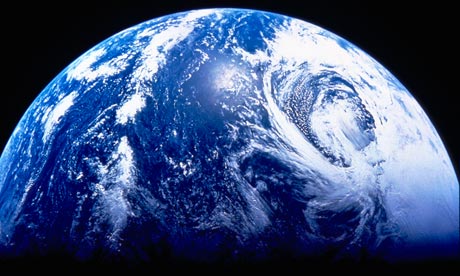Environment & Energy
Related: About this forumNever mind the economic deficit. What about the environmental one?
http://www.theguardian.com/commentisfree/2013/aug/20/earth-overshoot-day-environmental-deficit
Earth Overshoot Day: 'an estimate of the moment in the year when humanity has consumed more natural resources and created more waste than our biosphere can replace and safely absorb over a 12-month period.' Photograph: Corbis
Two contradictory ideas shape UK politics. First, the argument for austerity, that the nation cannot and should not live beyond its financial means. Second, the notion that we can and must, in effect, live beyond our environmental means. That is why any increase in our spending and consumption is hailed as economic success.
Today, the world goes into ecological debt, or "overshoot" – an estimate of the moment in the year when humanity has consumed more natural resources and created more waste than our biosphere can replace and safely absorb over a 12-month period.
Since the 1970s we've been living beyond our means, going into ecological deficit before the end of each year. And, the day when we hit "overshoot" has been creeping ever earlier. This year it falls two days earlier than in 2012. It now takes about 18 months for the biosphere to compensate for a year's worth of human consumption and waste. Conservatively, here in the UK we're using the equivalent of three and a half times the natural resources we have as a nation. For a country like Japan the figure is seven times. Many low-consuming countries in Africa are ecological creditors. Indonesia has been a creditor, but rising consumption and deforestation are running down its natural assets and pushing it over the brink.
For how long we can get away with not balancing the ecological books is a question that exercises many scientific minds, if unfortunately few political and economic ones. It's a bit like Jenga, the game with the tower of wooden blocks; you can keep taking them away for a while until, with a suspenseful amount of uncertainty, the whole thing collapses.
thucythucy
(8,038 posts)And the Jenga analogy is a good one.
Another analogy I've heard is that the environment is like a plane in fight, and we're the passengers. Each species is a rivet, each ecosystem, no matter how small, is one of the hundreds of thousands of complicated and interconnected components that keep us in the air. How many rivets, how many systems can you remove before the whole thing goes down in a blazing crash?
I suppose we can thank the fossil fuel lobby and its apologists, not to mention sheer laziness and unwillingness to think hard thoughts and make tough decisions, for the state we're in today.
By the time the damage becomes overwhelmingly clear, even to the doubters, it'll be far too late.
Future generations will curse us for our narcissism and stupidity.
pscot
(21,024 posts)There's still oil down there.
GliderGuider
(21,088 posts)The ecological footprint is a measure of human demand on the Earth's ecosystems. It is a standardized measure of demand for natural capital that may be contrasted with the planet's ecological capacity to regenerate. It represents the amount of biologically productive land and sea area necessary to supply the resources a human population consumes, and to assimilate associated waste. As it is usually published, the value is an estimate of how many planet Earths it would take to support humanity with everyone following their current lifestyle.
It has a number of fairly glaring flaws that cause it to be hyper-optimistic. The "ecological footprint" is basically for renewable resources only. It includes a theoretical but underestimated factor for non-renewable resources. It does not take into account the unfolding effects of climate change, ocean acidification or biodiversity loss (i.e. species extinctions). It is intuitively clear that no number of “extra planets” would compensate for such degradation.
4dsc
(5,787 posts)without our need to consume useless products we may not be having this problem.